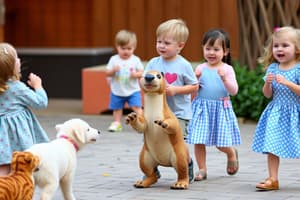Podcast
Questions and Answers
What is a common nervous habit observed in children due to excess energy?
What is a common nervous habit observed in children due to excess energy?
- Organizing
- Daydreaming
- Reading
- Pencil chewing (correct)
What is the average yearly weight gain for primary-school age children?
What is the average yearly weight gain for primary-school age children?
- 4 pounds
- 6.5 pounds (correct)
- 10 pounds
- 8 pounds
Which of the following factors does NOT influence a child's growth?
Which of the following factors does NOT influence a child's growth?
- Personal interests (correct)
- Medical conditions
- Nutrition
- Exercise
During which age range do children typically replace their primary teeth with permanent ones?
During which age range do children typically replace their primary teeth with permanent ones?
Which nutrient is crucial for strengthening bones and muscles in children?
Which nutrient is crucial for strengthening bones and muscles in children?
What change occurs in children's bones during childhood years?
What change occurs in children's bones during childhood years?
What is a characteristic of children's bodies during the growth spurt in primary school?
What is a characteristic of children's bodies during the growth spurt in primary school?
What aspect of children’s development is considered significant for engaging in various activities?
What aspect of children’s development is considered significant for engaging in various activities?
What is a potential consequence of children engaging in strenuous activities during growth?
What is a potential consequence of children engaging in strenuous activities during growth?
At what age can some girls start experiencing their menstrual period?
At what age can some girls start experiencing their menstrual period?
What distinguishes early puberty for girls from boys?
What distinguishes early puberty for girls from boys?
What is a common physical change that occurs in boys during early puberty?
What is a common physical change that occurs in boys during early puberty?
How does physical maturity typically differ between boys and girls during early puberty?
How does physical maturity typically differ between boys and girls during early puberty?
Why is it suggested to limit writing time for children?
Why is it suggested to limit writing time for children?
What role does the brain play in puberty?
What role does the brain play in puberty?
Which of the following changes occurs in girls primarily due to early puberty?
Which of the following changes occurs in girls primarily due to early puberty?
What is the primary reason for weight increase during late childhood?
What is the primary reason for weight increase during late childhood?
Which stage of Piaget's cognitive development occurs from birth to approximately 2 years of age?
Which stage of Piaget's cognitive development occurs from birth to approximately 2 years of age?
During which age range do children typically exhibit symbolic thought and language abilities according to Piaget?
During which age range do children typically exhibit symbolic thought and language abilities according to Piaget?
What happens to body fat in girls compared to boys during late childhood?
What happens to body fat in girls compared to boys during late childhood?
What is one characteristic of growth spurts during late childhood?
What is one characteristic of growth spurts during late childhood?
Which structure does not typically follow the normal curve of development in both genders?
Which structure does not typically follow the normal curve of development in both genders?
When does the development of armpit and facial hair typically begin?
When does the development of armpit and facial hair typically begin?
How much height do children typically gain during late childhood?
How much height do children typically gain during late childhood?
What is a defining characteristic of the preoperational stage of development?
What is a defining characteristic of the preoperational stage of development?
At what age range do children typically enter the Concrete Operational stage?
At what age range do children typically enter the Concrete Operational stage?
Which stage is characterized by the coordination of vision and touch leading up to more intentional actions?
Which stage is characterized by the coordination of vision and touch leading up to more intentional actions?
What developmental milestone is typically achieved during the Formal Operational stage?
What developmental milestone is typically achieved during the Formal Operational stage?
Which of the following is a motor development characteristic in infancy?
Which of the following is a motor development characteristic in infancy?
What marks the transition into the preoperational stage?
What marks the transition into the preoperational stage?
Which reflex is initiated when an object touches the roof of an infant's mouth?
Which reflex is initiated when an object touches the roof of an infant's mouth?
Which statement best describes the Tertiary Circular Reactions phase?
Which statement best describes the Tertiary Circular Reactions phase?
What is the main purpose of the sucking reflex in infants?
What is the main purpose of the sucking reflex in infants?
What is the response of an infant when the rooting reflex is triggered?
What is the response of an infant when the rooting reflex is triggered?
Which reflex is demonstrated when a baby's toes curl after the inner sole of their foot is stroked?
Which reflex is demonstrated when a baby's toes curl after the inner sole of their foot is stroked?
What development occurs in infants related to gross motor skills as they grow?
What development occurs in infants related to gross motor skills as they grow?
Which reflex is characterized by an infant throwing their arms and legs out in response to a sudden stimulus?
Which reflex is characterized by an infant throwing their arms and legs out in response to a sudden stimulus?
Fine motor skills primarily involve the use of which body parts?
Fine motor skills primarily involve the use of which body parts?
What is a hallmark of the tonic neck reflex in infants?
What is a hallmark of the tonic neck reflex in infants?
What does the galant reflex indicate when an infant's lower back is stroked?
What does the galant reflex indicate when an infant's lower back is stroked?
Study Notes
Child Development Overview
- Children are naturally active, with excess energy often expressed through nervous habits like fidgeting and nail-biting due to sedentary school activities.
- To combat fatigue from physical and mental exertion, activities should alternate between strenuous and relaxing (e.g., storytelling after math).
Height and Weight
- Average height increase for children is over 2 inches per year; weight gain averages about 6.5 pounds annually.
- Body composition changes lead to a slimmer appearance compared to preschool years; girls develop more fat cells relative to muscle.
- Growth factors include genetics, exercise, nutrition, medical conditions, and environmental effects.
Bones and Muscles
- Childhood is crucial for bone development, with bones growing longer and broader; good nutrition and exercise are vital for bone health.
- Primary teeth typically replaced by permanent teeth between ages 6 to 12.
- Nutrition and physical activity significantly influence bone mass; adequate calcium intake is essential for strong bones.
- Children may struggle with fine motor skills; excessive writing can lead to negative attitudes toward writing.
Late Childhood (Ages 12-18)
- Physical changes are unpredictable; increased familiarity with schoolwork aids motor skill development.
- Girls generally mature physically 2 years earlier than boys, with puberty starting as early as age 8 for girls.
Early Puberty
- Signs of puberty in girls include breast development and menstrual onset; boys experience testicle and penis enlargement.
- Secondary sexual characteristics develop differently, e.g., hair growth patterns vary between genders.
Height, Weight, and Muscle Development
- Weight gain in late childhood averages 2.3 to 3.2 kg annually; height increases by approximately 2.5 inches each year.
- Growth spurts may occur, prompting increased appetite.
- Body composition varies by gender, with girls showing earlier fat increase than boys, making them appear "chubby."
Brain Development
- Cognitive development spans four stages according to Piaget:
- Sensorimotor (birth-2 years): Understanding through sensory experiences and motor actions.
- Pre-operational (2-7 years): Use of symbolic thought, egocentrism prevalent.
- Concrete Operational (7-11 years): Logical thought and problem-solving abilities expand.
- Formal Operational (12+ years): Ability to think abstractly and theorize.
Motor Development in Infancy and Toddlerhood
- Motor skills progress from reflex actions to refined motor abilities.
- Basic automatic reflexes present at birth include:
- Sucking reflex: essential for feeding when mouth roof touched.
- Rooting reflex: turns head toward touch for feeding.
- Gripping reflex: strong grasp in palm, capable of supporting weight.
- Tonic neck reflex: limbs respond reflexively to head position.
Fine Motor Skills
- Fine motor skills involve the coordinated use of small muscles in hands and fingers, enabling writing and drawing.
- Coordination improves significantly during the first two years, evolving from crude movements to precise control.
Studying That Suits You
Use AI to generate personalized quizzes and flashcards to suit your learning preferences.
Description
This quiz explores the behaviors and energy levels of primary-school age children. Learn about the impact of traditional sedentary activities on their physical and mental well-being, and discover effective strategies for balancing energetic activities with quieter ones. Understand the signs of fatigue and ways to manage classroom dynamics.




